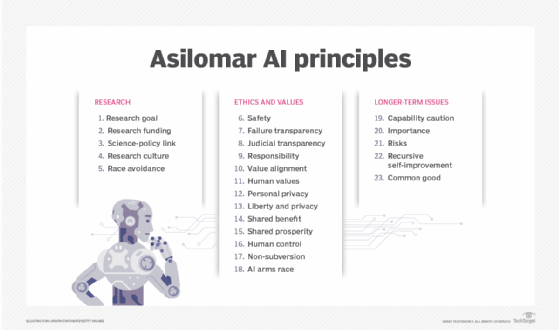Asilomar AI Principles
What are Asilomar AI Principles?
Asilomar AI Principles are 23 guidelines for the research and development of artificial intelligence (AI). The Asilomar Principles outline developmental issues, ethics and guidelines for the development of AI, with the goal of guiding the development of beneficial AI. The tenets were created at the Asilomar Conference on Beneficial AI in 2017 in Pacific Grove, Calif. The conference was organized by the Future of Life Institute.
The 23 principles were developed by a group of AI researchers, robotics, technology experts and legal scholars from different universities and organizations. These experts organized the AI principles at the Asilomar Conference while discussing the future of AI and its regulation.
The Future of Life Institute is a nonprofit organization founded in 2014 by MIT cosmologist Max Tegmark, Skype co-founder Jaan Tallinn, physicist Anthony Aguirre, DeepMind research scientist Viktoriya Krakovna and Tufts University postdoctoral scholar Meia Chita-Tegmark. Thousands of AI and robotics researchers have signed onto the principles, as well as with other endorsers from a variety of AI research leaders, including Google, Apple and OpenAI. In 2018, the state of California endorsed these principles.
The Asilomar AI Principles are divided into three categories: Research, Ethics and values, and Longer-term issues. Often, the principles are a clear statement of possible undesirable outcomes, followed by recommendations to prevent such an event.

Research
This subsection of five principles revolves around how AI is researched and developed as well as its transparency and its beneficial use:
- Research. The goal of AI research should be to create not undirected intelligence but beneficial intelligence. This means AI research should always be beneficial.
- Research funding. Investments in AI should be accompanied by funding for research on ensuring its beneficial use.
- Science-policy link. There should be constructive and healthy exchange between AI researchers and policymakers.
- Research culture. A culture of cooperation, trust and transparency should be fostered among researchers and developers of AI.
- Race avoidance. Teams developing AI systems should actively cooperate to avoid corner-cutting on safety standards.
Ethics and values
This subsection of 13 AI principles revolves around the ethics of AI and the values instilled while developing it:
- Safety. AI systems should be safe and secure throughout their operational lifetime and verifiably so where applicable and feasible.
- Failure transparency. If an AI system causes harm, it should be possible to ascertain why.
- Judicial transparency. Any involvement by an autonomous system in judicial decision-making should provide a satisfactory explanation auditable by a competent human authority.
- Responsibility. Designers and builders of advanced AI systems are stakeholders in the moral implications of their use, misuse and actions, with a responsibility and opportunity to shape those implications.
- Value alignment. Highly autonomous AI systems should be designed so that their goals and behaviors can be assured to align with human values throughout their operation.
- Human values. AI systems should be designed and operated to be compatible with ideals of human dignity, rights, freedoms and cultural diversity.
- Personal privacy. People should have the right to access, manage and control the data they generate, given AI systems' power to analyze and utilize that data.
- Liberty and privacy. The application of AI to personal data must not unreasonably curtail people's real or perceived liberty.
- Shared benefit. AI technologies should benefit and empower as many people as possible. This, for example, includes the use of AI to make jobs easier, the optimization of energy use or as expert Knowledge-based systems.
- Shared prosperity. The economic prosperity created by AI should be shared broadly, to benefit all of humanity.
- Human control. Humans should choose how and whether to delegate decisions to AI systems to accomplish human-chosen objectives.
- Non-subversion. The power conferred by control of highly advanced AI systems should respect and improve, rather than subvert, the social and civic processes on which the health of society depends.
- AI arms race. An arms race in lethal autonomous weapons should be avoided.
Longer-term issues
This subsection of five AI principles revolves around the importance, risks and potential good AI can provide in the long term:
- Capability caution. There being no consensus, we should avoid strong assumptions regarding upper limits on future AI capabilities.
- Importance. Advanced AI could represent a profound change in the history of life on Earth and should be planned for and managed with commensurate care and resources.
- Risks. Risks posed by AI systems, especially catastrophic or existential risks, must be subject to planning and mitigation efforts commensurate with their expected impact.
- Recursive self-improvement. AI systems designed to recursively self-improve or self-replicate in a manner that could lead to rapidly increasing quality or quantity must be subject to strict safety and control measures.
- Common good. Superintelligence should only be developed in the service of widely shared ethical ideals, and for the benefit of all humanity rather than one state or organization.
Learn more about AI governance and privacy and what it looks like in a framework.
